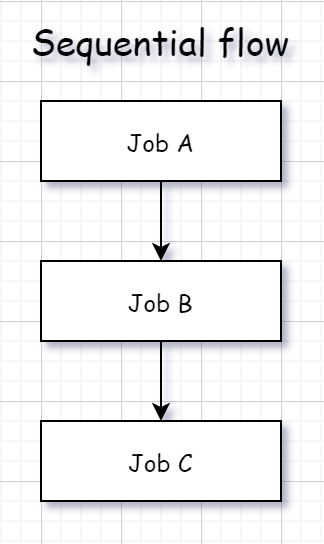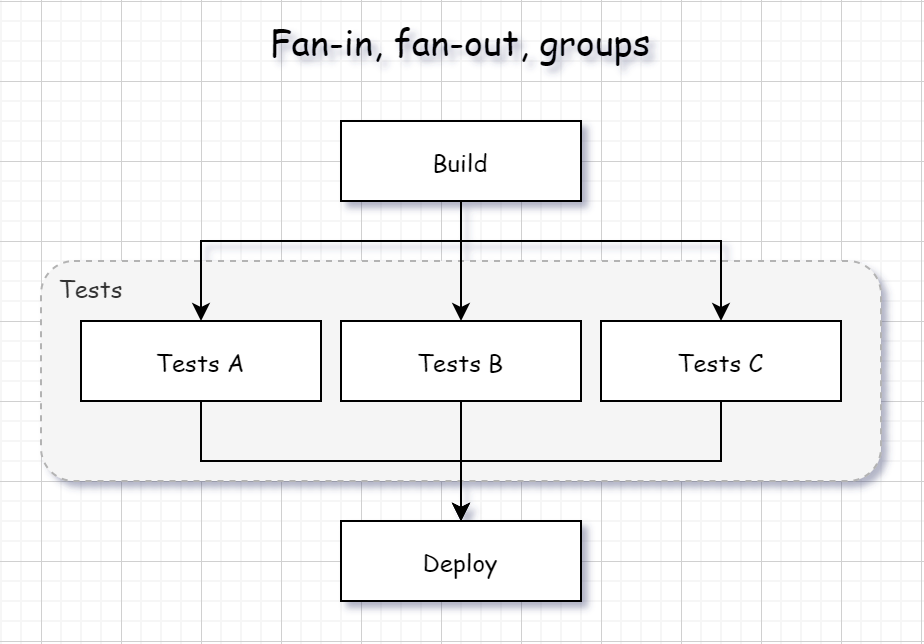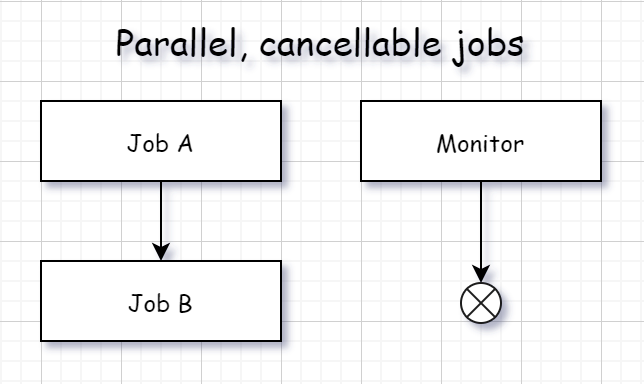Job workflows
AppVeyor can run “matrix” builds where you specify “dimensions” like image, platform, configuration, etc. and AppVeyor creates a build with multiple jobs testing all combinations of configured dimensions. All matrix build jobs are running in parallel (provided your account allows multiple concurrent jobs).
However, there could be more advanced CI/CD workflow requirements that cannot be implemented in a single build job or parallel matrix, for example:
- Building the project/tests once and then run multiple tests in parallel for the same build output;
- Deploy once all tests running in parallel are finished;
- Deploy to staging, run tests on staging, deploy to production, run tests on production.
AppVeyor allows to configure explicit jobs and their groups with dependencies between them which enables developer to run build jobs in sequence, implement fan-out/fan-in pipelines and spawn independent cancellable jobs.

Configuring job workflows
A general template for defining job workflows in appveyor.yml:
# Job definitions, sections in [] are optional
environment:
matrix:
- job_name: <job name 1>
[- job_group: <group name>]
[- jobs_per_group: N]
[- job_depends_on: <job or group name>]
[- job_allow_cancellation: true]
- job_name: <job name 2>
[- job_group: <group name>]
[- jobs_per_group: N]
[- job_depends_on: <job or group name>]
[- job_allow_cancellation: true]
...
# the first failed job cancels other jobs and fails entire build
matrix:
fast_finish: true
# configuration common for all jobs
init:
- appveyor version
- echo Some common logic here...
# job-specific configurations
for:
-
matrix:
only:
- job_name: <job name 1>
[- job_group: <job name 1>] # optionally, you can define the configuration for the entire group
build_script:
- echo Job 1
-
matrix:
only:
- job_name: <job name 2>
build_script:
- echo Job 2
...
The following example creates a build with 2 jobs building solution in parallel on Windows and Linux images:
environment:
matrix:
- job_name: Windows build
appveyor_build_worker_image: Visual Studio 2019
- job_name: Linux build
appveyor_build_worker_image: Ubuntu
matrix:
fast_finish: true
init:
- appveyor version
# job-specific configurations
for:
-
matrix:
only:
- job_name: Windows build
build_script:
- cmd: echo This is Windows-specific build script
-
matrix:
only:
- job_name: Linux build
build_script:
- sh: echo This is Linux-specific build script
Sequential flow
Build can be configured to run jobs one-by-one, for example build solution, deploy to staging, run tests on staging, deploy to production, run tests on production.

We use job_depends_on to implement sequential flow:
environment:
matrix:
- job_name: Job A
- job_name: Job B
job_depends_on: Job A
- job_name: Job C
job_depends_on: Job B
...
Fan-in, fan-out
Fan-out flow is when multiple jobs are spawned in parallel once a single job or a group is completed. Fan-in flow is when a single job or a group waits for a multiple jobs to complete:

The is appveyor.yml for the scenario presented on the figure above:
environment:
matrix:
- job_name: Build
- job_name: Tests A
job_group: Tests
job_depends_on: Build
- job_name: Tests B
job_group: Tests
job_depends_on: Build
- job_name: Tests C
job_group: Tests
job_depends_on: Build
- job_name: Deploy
job_depends_on: Tests
...
Cancellable jobs
You can have jobs which are automatically cancelled when the entire build is complete (succeeded or failed - doesn’t matter). These jobs could be some sort of “monitors” or services/dependencies (such as container with Redis or database) in Docker builds.

An example of cancellable job doing some work in a loop while the build is working:
environment:
matrix:
- job_name: Main work
- job_name: Monitor
job_allow_cancellation: true
for:
-
matrix:
only:
- job_name: Main work
build_script:
- cmd: echo This is the main job
-
matrix:
only:
- job_name: Monitor
build_script:
- ps: while($true) { Write-Host 'Do some checks'; Start-Sleep -s 1; }